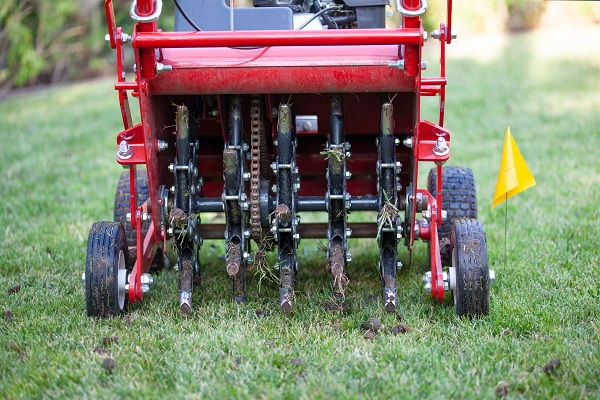Do you feel like you're doing everything right, but your lawn still looks discolored? In Arizona, it can be challenging for some folks to maintain a sod lawn due to the extreme heat of the summer and other factors. The solution to your sod woes might be lawn aeration. In Phoenix, aeration should be an integral part of lawn care. Here's why.

Relieve Soil Compaction -- Over time, foot traffic and dry periods can compact the soil. Aeration relieves this soil compaction. As a result, water quickly reaches the roots before it evaporates. Therefore, less water is needed. Likewise, fertilizer gets to the roots where it is needed.
Lawn Thatch Reduction -- It's good to allow your grass clippings to settle back into the lawn. The need for nitrogen fertilizer can be reduced 25-30 percent by doing so. The clippings decompose over time, thereby enriching and loosening the soil. However, if you have too many clippings left on your lawn, they can weave themselves into a water and air-resistant mat, known as thatch. Heavy thatch can leave your lawn starved for oxygen. Water sits on the thatch, and too much evaporates before it can soak in and nourish the soil and sod. When you aerate your lawn, soil plugs generated by aeration break down and release micro-organisms. These micro-organisms can speed the breakdown of the remaining thatch, which creates a healthier lawn.
Organic Fertilization -- To maximize the benefits of organic-based fertilizers, twice-a-year aeration may be preferable. 60 percent slow-release fertilizers are often the best match for freshly aerated lawns.
By contrast, fertilizers too-high in nitrogen can bring about unhealthy growth patterns. Finally, "weed-and-feed" style fertilizers should be avoided, because they are too potent when delivered directly to the roots of younger seedlings. Weed and Feed can actually kill or disfigure such plants.
Healing the Damage -- The heat tolerance of your Arizona grass is actually expanded through the aeration process. Lawns damaged by drought can recover more readily. Aeration allows the direct delivery of water and fertilizer to the roots of weakened turf. Grasses that are dormant in the winter can spring back to life more readily with aeration.
Enhance Disease Resistance -- A stronger, healthier lawn is also a more disease-resistant one. Plus, unhealthy organisms tend to thrive in heavily thatched lawns.
Germinating Chambers -- Think of those holes created by aeration as little chambers where seedlings can get established in an ideal environment of loose, moist soil. The plugs break down and loose soil drops into the holes, creating an ideal environment for the growth of new grass.
The bottom line is, invest in aeration in the short-term and enjoy water and fertilizer savings in the long-term.
Old lawns with extreme thatch, or lawns with heavy traffic are good candidates for aerification. Aerification is normally performed with a core aerator machine that pulls small "cores" out of the lawn, about a half-inch in diameter. This is a service that can be by a contractor, or you can rent an aerator from a local equipment rental company and do it yourself. For more lawn care tips, check out our lawn care frequently asked questions.
At Evergreen Turf, we grow, sell and install the healthiest sod in Arizona. With proper care, your investment in a sod lawn can pay off in a beautiful and functional lawn for years to come. Aeration can represent one helpful component in a complete lawn care regimen.
Select the perfect sod using our lawn selector. Once you've found the perfect type of grass, you can order online or by phone. Learn how to measure your lawn and how to install your new lawn with our helpful online guides.
Enter your email address below and we'll remind you when it's time to reseed & change your irrigation schedule. You can remove yourself from our list at any time.
For questions or to order by phone call:
(480) 456-1199